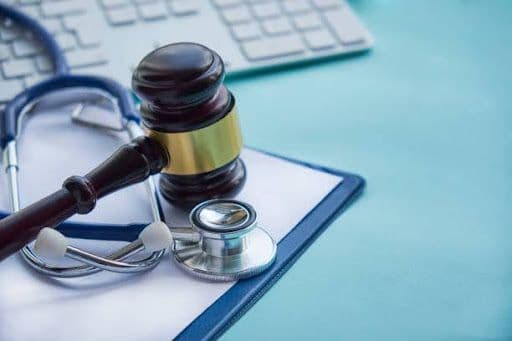Yes, peptides can be safe and legal when used under proper medical supervision. Many peptides help with weight loss, hormone support, or recovery, but it’s important to only use them with guidance from a healthcare professional who can ensure they’re right for you and used safely. Always make sure to get peptides from trusted sources to avoid low-quality or unsafe products.
However, most impactful peptides require a prescription and are regulated to ensure safety. With growing interest in peptide therapy, it's critical to know which options are truly legal and clinically backed. Many peptides available outside of medical supervision are research-grade products not intended for human use. Using such unregulated peptides can pose serious risks; educating yourself now can help you avoid costly health mistakes later.
At Vita Bella, our clinicians ensure every peptide treatment is medically prescribed, follows current regulations, and is tailored to your goals. If you’re curious about safe, legal, and effective peptide therapy backed by studies, explore our services or contact us at (480) 602-0444 to get a free wellness consultation.
Are Peptides Legal Without a Prescription in the U.S.?
Only certain peptides are legal to use without a prescription, and most of the ones that deliver noticeable results are classified as drugs by the FDA. While some over-the-counter supplements like collagen are allowed, many therapeutic peptides fall into a grey area that confuses consumers.
What makes it more complicated is that some online vendors exploit labeling loopholes, marketing unapproved peptides as “research chemicals” and labeling them as "not for human consumption" to bypass regulations. This practice puts buyers at serious legal and health risk. Here’s what you need to know to stay safe and compliant:
FDA Regulation: The FDA classifies most therapeutic peptides (like semaglutide or liraglutide) as prescription-only medications due to their potent biological effects.
Over-the-Counter Exceptions: Common peptides like collagen are allowed over the counter because they’re considered supplements, not drugs.
Import and Vendor Risks: Buying from unlicensed or overseas sellers increases the chance of receiving non-sterile, mislabeled, or banned compounds.
Prescription = Legal + Safe: Legally obtaining peptides through a licensed provider ensures they meet safety, compounding, and FDA compliance standards.
Do Peptides Need a Prescription to Be Safe and Effective?
Yes, most therapeutic peptides must be prescribed to ensure both safety and effectiveness. Peptides work by signaling specific biological processes, and improper dosing or timing can disrupt these pathways. Without medical oversight, individuals risk side effects like hormonal imbalances or severe reactions from contaminated or mislabeled products. Additionally, the FDA regulates many of the most effective peptides, meaning they’re only legally available through a licensed provider who can customize dosing and adjust treatment as needed.
What Is the Legal Status of Peptides?
In the United States, the Food and Drug Administration (FDA) oversees the regulation of peptides intended for therapeutic use. Such peptides must complete extensive clinical trials to demonstrate their safety and effectiveness. Let's dive deeper into the legal status of peptides:
Science and Legal Considerations
Understanding peptides requires recognizing their promising benefits in the medical and wellness fields alongside potential risks from misuse. While peptides offer valuable therapeutic and cosmetic applications, ethical and health concerns arise with improper use, making it essential to evaluate both sides carefully.
Informed Choices and Responsible Usage.
Responsible use of peptides depends on educating consumers, healthcare providers, and athletes about their effects and risks. Well-informed decisions reduce misuse and promote safe, ethical applications, ensuring peptides are used appropriately for intended health benefits.
The Impact of Continued Research and Public Engagement on Regulatory Development
Ongoing research and open communication between scientists, regulators, and the public are crucial for shaping balanced policies. This collaboration fosters transparency and helps establish regulations that support innovation while safeguarding public health.
Can You Legally Use Peptides for Tissue Repair?
Yes, peptides can be legally prescribed for tissue repair when recommended by a licensed healthcare provider. Peptides like BPC-157 are often used to support healing and recovery from injuries. However, it is essential to obtain these treatments through regulated medical channels to ensure safety and proper usage under professional supervision.
Use of BPC-157 Orally
BPC-157 is a synthetic peptide derived from a protein found in the stomach. It is widely recognized for its powerful regenerative properties. Unlike many peptides that require injections, BPC-157 is often administered orally, making it a more accessible and convenient option for many patients.
Benefits for Tissue Repair and Healing
One of the primary benefits of oral BPC-157 is its ability to promote tissue repair. It supports the healing of muscles, tendons, ligaments, and even the lining of the digestive tract. This peptide has been shown to accelerate recovery from injuries by enhancing blood vessel growth (angiogenesis) and reducing inflammation in affected areas.
Support for Inflammation and Pain Reduction
BPC-157 also plays a role in modulating inflammation, which can reduce pain and swelling associated with injuries or chronic conditions. This anti-inflammatory effect helps improve mobility and comfort during the recovery process.
Enhanced Joint and Soft Tissue Health
Many patients use oral BPC-157 to support overall joint and soft tissue health. Its regenerative properties help maintain the integrity of connective tissues, potentially lowering the risk of re-injury and promoting long-term musculoskeletal wellness.
How Can You Identify Safe and Legal Peptide Sources?
You can identify safe and legal peptide sources by checking clinically backed data and proper labeling. Verifying these factors is critical for avoiding unsafe or illegal products. Many vendors sell peptides without regulation, which increases the risk of contamination, incorrect dosing, or misleading claims. To ensure your safety, continually evaluate your provider and product through the following key criteria:
Labeling: for Human Use
Always verify that the peptide is clearly labeled for human use and comply with regulatory standards. Proper labeling ensures the product is intended for medical or therapeutic applications, reducing the risk of unsafe or unapproved substances.
Licensed Medical Oversight
Only use peptides prescribed by qualified healthcare providers who ensure proper dosing and safety.
Which Conditions Typically Qualify for Prescription Peptide Use?
If you're experiencing metabolic issues, chronic fatigue, slow recovery, or aging concerns, prescription peptides may be beneficial. At Vita Bella, we use a customized approach to assess medical history, lab values, and personal goals before starting peptide therapy.
Feeling Stuck? Discover How Vita Bella Can Help You Recover Naturally
Many people feel constantly tired, gain weight despite their efforts, or recover more slowly than expected, so you're not alone. These are some of the most common signs that your body may be lacking essential cellular signals, often supported by prescription peptides. But with so much misinformation online, how do you know what’s safe? At Vita Bella, we take the confusion out of peptide therapy. Our expert clinicians evaluate your health profile to prescribe only FDA-compliant, research-backed treatments that genuinely work.
FAQs
Are peptides considered steroids?
No, peptides and steroids work differently. Peptides trigger your body to release hormones naturally, while steroids introduce synthetic hormones. This makes peptides less invasive but still requires caution and oversight. They may produce similar results in muscle growth or fat loss, but the mechanisms and risks are not the same.
Are injectable peptides safe to use without medical supervision?
No, using peptides without clinical supervision can be dangerous. Risks include infection, dosage errors, and long-term hormonal side effects. Always consult a medical provider. Proper handling, sterile injection technique, and dosage control are critical for safety.
Can I buy peptides online legally?
Over-the-counter peptides like collagen are legal to buy online, but most therapeutic peptides require a prescription and medical supervision. To stay compliant and safe, always purchase peptides through licensed medical providers like Vita Bella.
Do I need a prescription for peptides?
Some peptides require a prescription from a licensed healthcare provider, while others may be available for general purchase. This varies by location and the specific peptide.
Does Vita Bella offer a testosterone prescription online?
Vita Bella offers a membership which connects you to doctors who can prescribe testosterone online.





















